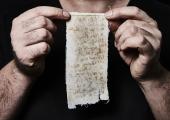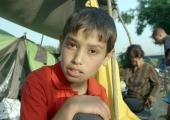It doesn’t take long, I think, to work out the associations of the title of Insyriated: we are surely being presented with a variation of “incarceration”, one tinged by the very specific context of the conflict that has ravaged Syria for six years now. But there’s a certain ambiguity at the centre of Belgian director Philippe Van Leeuw’s film about a Damascus family confined in their apartment as civil war goes on around them – they have not been literally locked up by anyone, rather their temporary self-confinement, presided over and enforced by the powerful matriarch Oum Yazan (Hiam Abbass), is their best, perhaps only chance of survival.
It forces us to appreciate a situation tragically played out in the Syrian conflict, although it could equally well apply to any such war zone. Outside is a place of peril, a courtyard where any movement can be caught by snipers. Inside, the curtains are drawn, the door is heavily bolted, and at moments of bombardment – or any other physical encroachment – the only retreat is a corner of the kitchen, away from windows, behind yet more locks (the family hiding-place, pictured below). In between sporadic moments of drama, the challenge is to maintain an illusion, any illusion of normality, simply to carry on living.
Then the violence of the outside world suddenly intrudes
Though claustrophobia is certainly an element, what Insyriated captures best are the long pauses, the moments of protracted limbo that come between the film’s eruptions of action. Van Leeuw opens his film – and closes it, too – with the image of an old man smoking, complete with a tranquillity that seems almost outside time. In the early morning light Virginie Surdej’s camera pans slowly around the spacious room in which he sits, revealing pictures on the walls and long shelves of books: this is clearly the home of a family from the intelligentsia. In a bedroom, a young couple are discussing their chance of escape, how they can travel to Beirut that night. For their baby child, Halima (Diamand Abou Abboud) knows that it is an opportunity that must be risked, even as her husband Samir admits that leaving his homeland makes him feel, in the most curious way, ashamed.
Then the violence of the outside world suddenly intrudes. On his way to sort out some last things before their departure, Samir sprints across the courtyard, but is caught by a sniper’s bullet; his body thrown behind a burnt-out car, it’s unclear whether he’s alive or dead. Delhani (Juliette Navis), the family maid, witnesses the shooting, and hurries to tell Oum Yazan. Any attempt to retrieve the body impossible during daylight, the latter resolves to keep the news from Halima, a decision that will later create incremental conflict.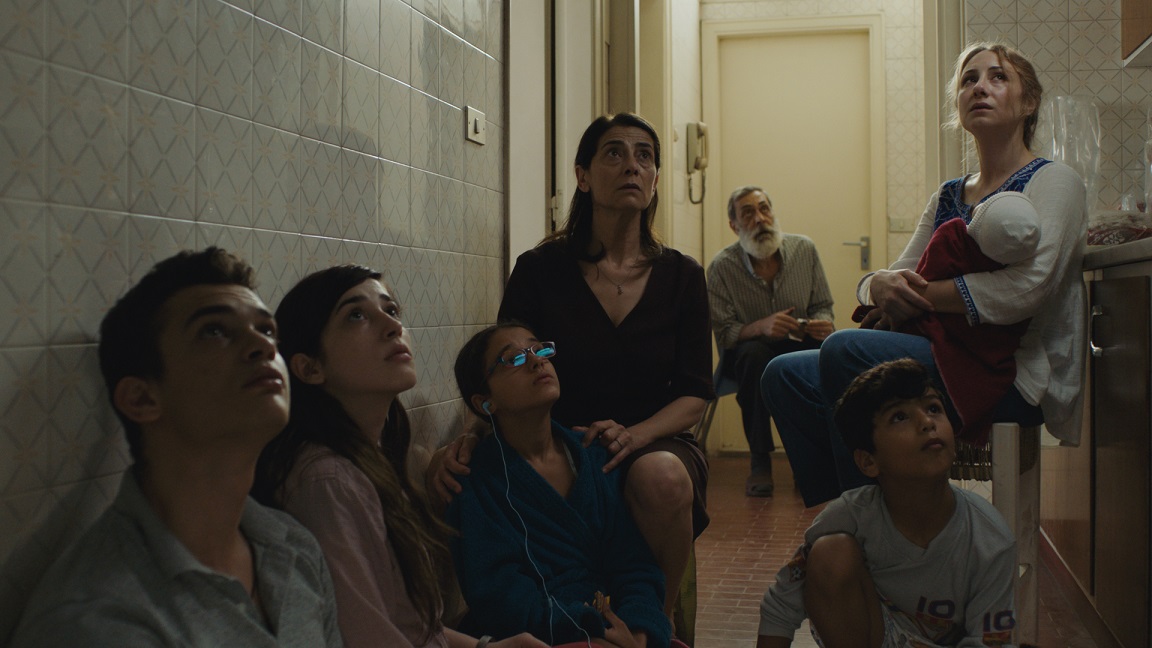 As the day starts, the rest of the family – two daughters, Yara and Aliya, and son Yazan – appears and interrelationships become clear. Halima and Samir are actually neighbours: their upstairs apartment damaged, they have been welcomed into this home. Another visitor is Kareem, Yara’s boyfriend, who had unwisely come to visit her and is now unable to return home until the situation outside calms down. The old man is Oum Yazan’s father-in-law Mustafa (Mohsen Abbas); her husband is expected back, but attempts to make contact with him prove fruitless.
As the day starts, the rest of the family – two daughters, Yara and Aliya, and son Yazan – appears and interrelationships become clear. Halima and Samir are actually neighbours: their upstairs apartment damaged, they have been welcomed into this home. Another visitor is Kareem, Yara’s boyfriend, who had unwisely come to visit her and is now unable to return home until the situation outside calms down. The old man is Oum Yazan’s father-in-law Mustafa (Mohsen Abbas); her husband is expected back, but attempts to make contact with him prove fruitless.
The film is carried by the sheer force of Abbass’s performance, the haggard strength of her face revealing an unspoken conviction that life must be kept going somehow, even as it barely conceals the turmoil behind her features. Explosions outside are followed, only moments later, by her insistent phrases of reaction – “Now, some more dusting”, “Lunch is ready” – that highlight the desperate incongruity of the situation. It’s an anxiety that will come close to hysteria when, the sanctum of the apartment breached, the film’s central scene brings the horror of the outside world, in its cruellest sense, into this domestic environment. Surdej’s cinematography helps to raise that sense of tension into something close to terror, while the film’s sound design jolts us back and forth between external and interior spaces, the latter world also defined by Jean-Luc Fafchamps’s minimal score, all piano chords and strings.
The actuality of its subject is bound to make Insyriated powerful, and it leaves a lasting impression, even if, with hindsight, there’s also a certain sense of the formulaic. The only professionals in the cast are Abbass, Abboud and Navis (who is a French actress), the remaining parts played by Syrian refugees in Lebanon, where the film was made. It is nothing less than chilling that the world on screen is so close to their first-hand experience: Insyriated is an urgent film that forces us to confront the desperate human consequences of conflict.
Overleaf: watch the trailer for Insyriated


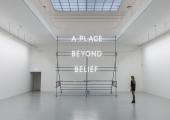

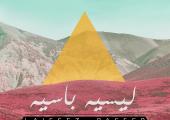
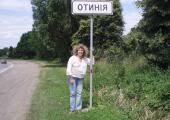
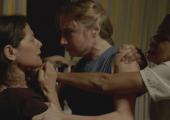
 As the day starts, the rest of the family – two daughters, Yara and Aliya, and son Yazan – appears and interrelationships become clear. Halima and Samir are actually neighbours: their upstairs apartment damaged, they have been welcomed into this home. Another visitor is Kareem, Yara’s boyfriend, who had unwisely come to visit her and is now unable to return home until the situation outside calms down. The old man is Oum Yazan’s father-in-law Mustafa (Mohsen Abbas); her husband is expected back, but attempts to make contact with him prove fruitless.
As the day starts, the rest of the family – two daughters, Yara and Aliya, and son Yazan – appears and interrelationships become clear. Halima and Samir are actually neighbours: their upstairs apartment damaged, they have been welcomed into this home. Another visitor is Kareem, Yara’s boyfriend, who had unwisely come to visit her and is now unable to return home until the situation outside calms down. The old man is Oum Yazan’s father-in-law Mustafa (Mohsen Abbas); her husband is expected back, but attempts to make contact with him prove fruitless.
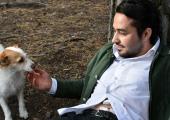
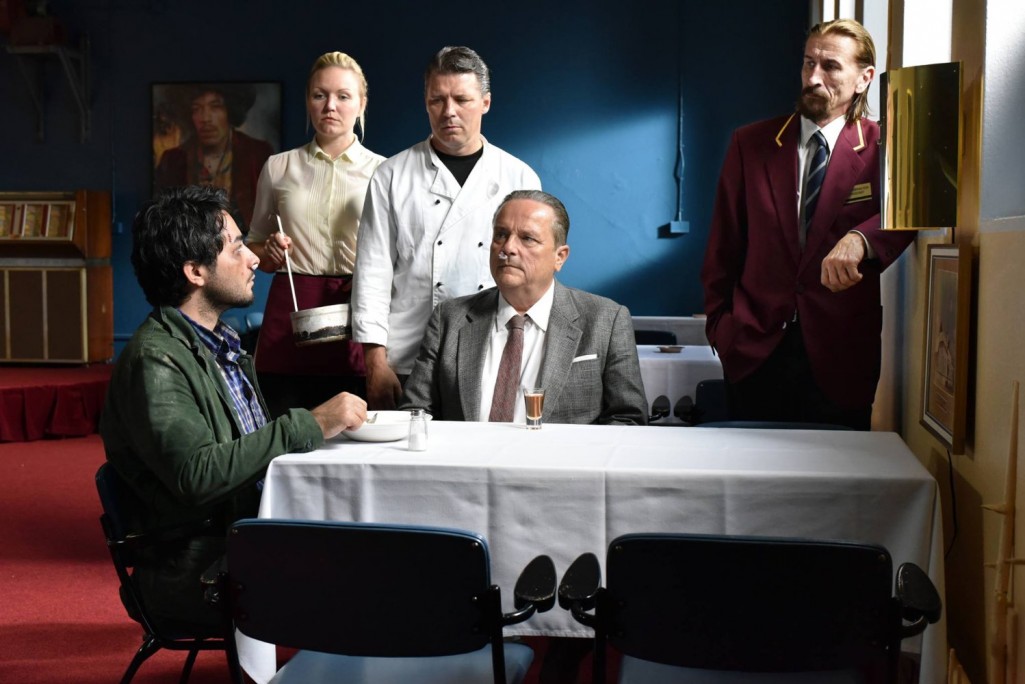 Wikström also jettisons his boring job selling clothes to small outfitters around the country. He flogs off his stock of cellophane-wrapped shirts for a derisory sum and is left with his big old car and a handful of cash. Instead of heading for sunnier climes, he buys a shabby drinkers’ dive, the Golden Pint, where fishballs are always dish of the day. The three surly staff haven’t had their wages paid in months and regard the new owner with suspicion. It's more than an hour into the film before Khaled and Wikström meet, and then it isn't exactly cute – a fight by the restaurants' bins – but a friendship develops.
Wikström also jettisons his boring job selling clothes to small outfitters around the country. He flogs off his stock of cellophane-wrapped shirts for a derisory sum and is left with his big old car and a handful of cash. Instead of heading for sunnier climes, he buys a shabby drinkers’ dive, the Golden Pint, where fishballs are always dish of the day. The three surly staff haven’t had their wages paid in months and regard the new owner with suspicion. It's more than an hour into the film before Khaled and Wikström meet, and then it isn't exactly cute – a fight by the restaurants' bins – but a friendship develops.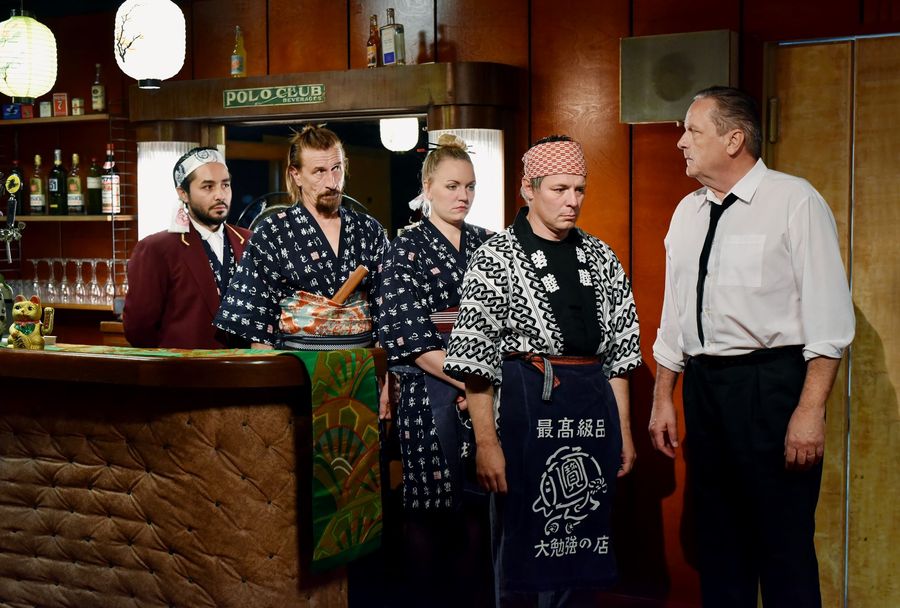 There are many familiar pleasures from the director whose biggest hit was Leningrad Cowboys Go America back in 1989. The Other Side of Hope generously showcases the indigenous bar band circuit of Finland. Who knew that there were still so many hairy Finnish musicians who sound like Dire Straits and sing fabulously miserable songs? And for those mourning Laika, the adorable dog in Le Havre, there is a new dog to provide some winsome comedy at the diner when the health and safety inspectors come to call.
There are many familiar pleasures from the director whose biggest hit was Leningrad Cowboys Go America back in 1989. The Other Side of Hope generously showcases the indigenous bar band circuit of Finland. Who knew that there were still so many hairy Finnish musicians who sound like Dire Straits and sing fabulously miserable songs? And for those mourning Laika, the adorable dog in Le Havre, there is a new dog to provide some winsome comedy at the diner when the health and safety inspectors come to call.